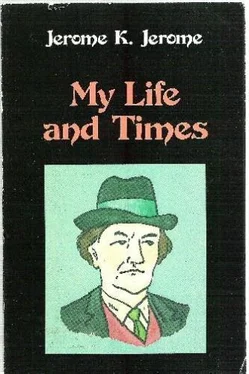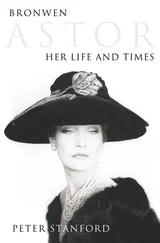It had been a trying winter, and my age had been against me. At the end of it, I was not much more good for the work. I came back cured of any sneaking regard I may have ever had for war. The illustrations in the newspapers, depicting all the fun of the trenches, had lost for me their interest. Compared with modern soldiering, a street scavenger's job is an exhilarating occupation, a rat-catcher's work more in keeping with the instincts of a gentleman. I joined a little company who, in defiance of the Press and of the Mob, were making an appeal for a reasonable peace. We made speeches in Essex Hall and in the provinces. Among others on our platform, I recall Lord Parmoor, Buckmaster, the Earl of Beauchamp, Ramsay MacDonald, Dean Inge, Zangwill, the Snowdens, Drinkwater, and E. D. Morel the great-hearted. We had one supporter in the Press, Common Sense , edited by F. W. Hirst, who right through the war kept his flag flying with tact and good-humour. Later, Lord Lansdowne came to our aid. Lord Northcliffe, who died not long afterwards of a lingering brain disease, suggested he must be suffering from senile decay. Whether we did any good, beyond satisfying our own consciences, I cannot say.
The war ended in 1918. From 1919 to 1924 there was every prospect of France's regaining her old position as The Enemy. Reading the French papers, one gathered that nothing would please France better. At the present moment (1925) a growing party would seem to be in favour of substituting Russia. It may be that the gods have other plans. The white are not the only herds. The one thing certain is that mankind remains a race of low intelligence and evil instincts.
Chapter XIII
LOOKING FORWARD
We were chapel folk. My mother came of Welsh Nonconformist stock; and my father, until he was forty-five, had been an Independent minister—Congregationalists they call them now—and had preached from his own pulpit. I remember talk of pamphlets he had written. One had been in answer to a writer named Thomas Paine, who, according to a great-aunt of mine, credited with knowing the whole of the New Testament by heart, was really Antichrist, and had been prophesied. I was brought up to believe in a personal God who loved you if you were good; but, if you were wicked, sent you, after you were dead, to a place called Hell, where you were burnt alive for ever and ever. My mother had the idea that it was not really for ever and ever; because God was so full of loving-kindness that He would not want to hurt any creature more than He could help; and that, when they had been punished sufficiently and had repented, He would forgive them. But that was only her fancy; and perhaps it was wrong of her to think so. I had had a little brother who had died when I was a baby. My mother would never tire of telling me about him, repeating all the wonderful things that he had said. She would always end by explaining that he was now in Heaven with Jesus, and far happier than he ever could have been on earth: adding, as she would wipe the tears from her cheeks, that it was wicked and selfish of her not to be able to help crying when she thought of him. I remember the look of happiness that came into her eyes, years later, a few days before she died. She had been lying very quiet, with her eyes wide open. Suddenly she clasped her hands. “I shall see him soon now,” she said, “and he will be so beautiful.” It was a queer place, this Heaven of my people. It rather frightened me. Gold entered a good deal into the composition of it. You wore a golden crown, and you played upon a golden harp, and God sat in the centre of it—I pictured it a bare, endless plain—high up upon a golden throne; and everybody praised Him: there was nothing else to do. My mother explained that it was symbolism. All it meant was that we should be for ever with the Lord, and that He would take away all pain. But it was the ever-and-everness of it that kept me awake of nights. A thousand years—ten thousand—a million! I would try to count them. And still one would be no nearer to the end. And God would always be there with His eyes upon one. There would never be any getting away by oneself, to think.
Until I was fourteen, I used to kneel and say my prayers each night and morning. I was told that whatever I prayed for, really believing that I should obtain it, would be granted me. If it were not, that proved I had not had sufficient faith. They were a mixed collection, those childish prayers of mine. If they ever did reach Heaven, I cannot help thinking they must have caused amusement, even up there: that God would wake me early in the morning; that He would forgive me for having wished that the boy at the coalshed was dead—he used to run after me and kick me; that God would put it into somebody's heart to give me a white rabbit; that He would make me like fat—preferring it, if anything, to lean—because it was good for me. There were others: some of them quite reasonable. Once, I prayed that I might find a half-sovereign I had lost. My father had sent me out with it to buy a post-office order. It was in my trousers pocket when I started. Both my mother and I had felt it there. But, when I went to pay for the order, it was gone. I had run up and down the crowded streets for hours, though knowing it was useless. My father had said nothing; but my mother's face had gone white; and I had cried myself to sleep. I went straight to the post office the next morning, getting there before the doors opened. It was lying in the dust, underneath the counter, just where I had been standing. And that time, I had not believed, or attempted to believe: it had seemed too impossible. While other times, when I really had believed, God had taken no notice.
My mother thought the explanation was that God granted us only those things that were good for us: and that always He knew best.
“Papa and I,” she confided to me, “so often kneel and pray that business may improve, and that He will bless papa's enterprises, so that our burthen may be lighter. But things don't seem to get any better.”
God tried us in the furnace. But whatever happened we must always believe in Him. “Though He slay me, yet will I trust in Him.”
But why then all this fuss about faith, if He did not really mean it? And why did He think things were not good for us that were good for other people? It was not till long after, when I came across an old diary of my mother's, that I learnt how hard had been the struggle for bare existence during those last years of my father's life. But I knew that we were poor. I remember how tired my mother would get, walking, and yet would never take the omnibus. She promised she would always do so when our ship came home. Sometimes, I could not help feeling angry with God for showering favours upon others while being so stingy, as it were, to us. There was a white-whiskered old gentleman, who occasionally asked us to tea, a Mr. Wood, with fat fingers and a great gold chain, of whom God must have been particularly fond. He rode in a carriage and pair, and had servants to wait upon him. He told me once it was God who had given him everything. God had “prospered” him. He had lately built God a chapel, and as a result was richer than ever. My father had built a chapel, mostly out of his own money, when he was a young man. True, it was only a little one, compared with Mr. Wood's great red-brick edifice off the Bow Road; and God had apparently forgotten it, altogether.
For in those days, among religious folk, there was no doubt that God gave all things literally: the good things of this world as well as of the next. I remember a hymn I learnt at Sunday school:
“Whene'er I take my walks abroad,
How many poor I see.
How grateful should I be to God
For all His gifts to me.”
I was to praise God that I was well fed and warmly clad, while others wore but filthy rags, and begged from door to door. God ordered all things, and was satisfied with them, presumably.
Читать дальше










